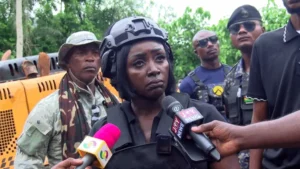
John Dramani Mahama, former president of Ghana
Former Ghanaian President John Mahama’s recent call for a ‘honeymoon’ period, should he return to a leadership role, has ignited heated discussions in political circles. The plea not only triggers a thorough examination of Mahama’s readiness for a potential return to the nation’s highest office but also raises concerns about the preparedness of his prospective administration.
Prominent Governance and Political Activist, Emmanuel Senyo Amekplenu, joins the debate in an article, expressing deep-seated concerns about the implications of Mahama’s unusual request. Amekplenu contends that the call for a ‘honeymoon’ period suggests a lack of adequate preparation on Mahama’s part, a potential absence of clarity in his agenda, and a troubling inability to effectively manage the expectations of the Ghanaian populace.
Amekplenu argues that leaders who are well-prepared typically enter office with a clearly defined and comprehensive agenda. Therefore, Mahama’s plea raises doubts about the readiness of the National Democratic Congress (NDC) or its strategic plans to address the pressing issues facing the nation, casting a shadow over his aspirations for a return to power.
The political activist asserts that Mahama’s plea indicates an acknowledgment of a gap between public expectations and the actual readiness of his potential administration. He emphasizes that effective leaders manage expectations through transparent communication and decisive action, rather than seeking a temporary respite from public scrutiny.
While exploring various interpretations of Mahama’s plea, Amekplenu delves into the possibility that it might be perceived as a strategic move to buy time and gain political leverage. However, he also acknowledges an alternative perspective that considers it a genuine concern about the potential administration’s ability to handle the responsibilities of governance effectively. Regardless of the motive, Amekplenu underscores the potential detrimental optics, warning of the public perceiving it as an admission of unpreparedness.
In Amekplenu’s assessment, effective leadership demands decisiveness, strategic planning, and the ability to navigate challenges promptly. He argues that Mahama’s plea sends the wrong message to both citizens and the international community, potentially eroding confidence in the future administration’s capability to govern effectively.
While recognizing that leaders may face a learning curve in their initial days in office, Amekplenu emphasizes the imperative for Mahama to demonstrate robust leadership, clarity of purpose, and a genuine commitment to addressing the pressing challenges facing the nation.
The unfolding debate surrounding Mahama’s plea continues to captivate political observers, with the Ghanaian public eagerly awaiting further developments and clarifications on the former president’s stance as the political landscape takes on an increasingly scrutinizing gaze.






